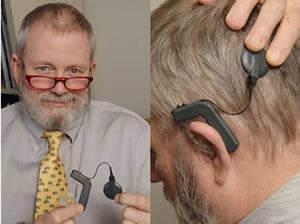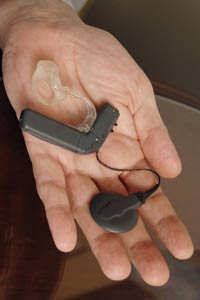The cross-breed device, called the DUET Electric-Acoustic System, or EAS, is already used in Europe, but not yet approved for use in the U.S. It targets a population currently falling through the cracks — borderline cases for which hearing aids don't adequately distinguish sounds, but for who some natural hearing remains. For these individuals, cochlear implants that entirely replace natural hearing aren't recommended either.

Dr. Peter Roland, chairman of otolaryngology-head and neck surgery, is leading the local clinical trial of a new hybrid hearing aid/cochlear implant device designed for patients who can benefit from both.
Hearing aids are typically worn on the outside of the ear by people who still have some natural hearing. Cochlear implants are surgically implanted into the ear and pick up lost middle- and higher-frequency sounds. They replace lost natural hearing by digitizing electrical impulses sent to the brain via wires implanted in the ear. The brain then interprets that as sound.
Most people with hearing difficulties have one or the other device, but not both.
Initial studies on the hybrid device suggest there is a synergistic effect achieved by maintaining the natural hearing and coupling it with the cochlear implant, particularly for distinguishing speech in noisy environments. The device both amplifies low frequencies and electronically stimulates middle and high frequencies.
The implant is specifically designed with a thin electrode to occupy less space in the inner ear. It is implanted by special surgical techniques to preserve natural hearing.
"What patients can hope to get from the investigational device is a significant improvement in the ability to understand speech, especially in a noisy situation," said Dr. Peter Roland, chairman of otolaryngology-head and neck surgery at UT Southwestern.
The device is made by MED-EL Corp., which conducts the initial patient screening for the trial. The device is still investigational, so all of the potential risks are not known, Dr. Roland said. The most common serious complication is loss of what hearing is left in the ear that receives the implant. The opposite ear is unaffected. Significant hearing loss has occurred in 10 percent to 15 percent of recipients to date.

The DUET Electric-Acoustic System, or EAS, is worn behind the ear and implanted by special surgical techniques to preserve natural hearing.
UT Southwestern is among about a dozen sites participating in the national trial. UT Southwestern researchers are seeking about a dozen participants, said Dr. Roland.
Potential study participants must be at least 18 years old, have moderate sloping to severe profound hearing loss, and have had minimal results from traditional hearing aids. Patients appropriate for the study will still have some natural hearing left but find themselves struggling to understand loud speech, particularly in noisy, crowded situations, even while wearing high-quality hearing aids. The target patient has hearing loss in high frequencies, but also requires a hearing aid to boost low-frequency sound.
"We need people who are not getting enough benefit from their hearing aids to live normal lives, but who are not quite deaf enough for a regular cochlear implant," explained Dr. Roland.
Approved study participants will be asked to provide their current hearing test results for review and will be retested if the initial results fit the profile. If approved, the new device will be implanted behind the ear during a two-hour outpatient surgery. Local participants then will have several follow-up visits at UT Southwestern to evaluate how the device is working. The surgery and follow-up care — taking place over about a 15-month period — is provided without charge to participants.
Potential trial candidates can call 214-648-7151 or e-mail betty.loy@utsouthwestern.edu.
Visit www.utsouthwestern.org/earnosethroat to learn more about UT Southwestern's clinical services in otolaryngology.
Taken from www.utsouthwestern.edu

